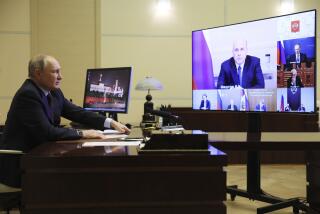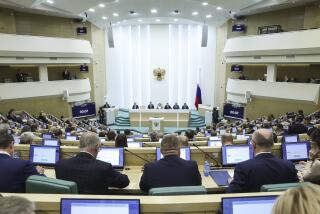Genius and Cloddishness
- Share via
The Soviet declaration of a five-month moratorium on nuclear-weapons testing has no real substance. But as propaganda the Soviet move was sheer genius. We wish that we could say the same for the Reagan Administration’s quick, unconditional rejection of Moscow’s invitation to join in the moratorium.
Secretary of State George P. Shultz would have been better advised to say merely that the Soviet initiative would be studied. A later, more substantial reply could then have dealt with the fact that what is needed is not a moratorium, which is by definition temporary and unpoliced, but a carefully crafted treaty outlawing all nuclear tests.
The propagandistic nature of the Soviet initiative is deplorable, to say the least.
The starting date for the Soviet moratorium just happens to be Aug. 6, the 40th anniversary of the U.S. nuclear attack on Hiroshima that killed 64,000 Japanese. The moratorium will make Moscow look good to Third World countries that are attending the nuclear non-proliferation treaty review conference in September. And it will help put President Reagan on the defensive in his October summit meeting with Soviet leader Mikhail S. Gorbachev.
There is good reason to doubt Moscow’s sincerity, given the modernization of the Soviet nuclear forces that U.S. intelligence sources see as continuing well into the 1990s. But the Soviet initiative was essentially cost-free. The Russians are in the process of completing a nuclear-test program of their own, and probably have no need to test for a while, anyway. And they could be reasonably confident that the Reagan Administration would reject the offer of an open-ended moratorium extending beyond Jan. 1.
Prof. Herbert York of UC-San Diego, the chief American negotiator at the comprehensive test-ban negotiations under President Jimmy Carter, is among those who say that an unpoliced moratorium is not a good idea. We had an agreed-on test moratorium from 1958 to 1961, but the Soviets broke it as soon as their laboratories were ready for another series of nuclear tests.
What does make sense is another attempt to put together a carefully negotiated, reasonably verifiable comprehensive test-ban treaty.
If such a treaty were successfully negotiated, the huge nuclear armadas on each side would continue to exist. But if new warheads for new weapons could not be tested, both nations would gradually lose confidence that their weapons would work, and would be less likely to gamble on them in a crisis. A complete test ban, if verifiable, is probably the simplest way to come to grips with the qualitative side of the nuclear-arms race.
There is a downside. A comprehensive test ban would put an effective halt to the trend toward smaller and less deadly nuclear weapons. It would also make it very difficult to keep effective nuclear laboratories in operation as a hedge against violations by the other side--a disability that would not be shared by the secretive, authoritarian Soviet society.
On balance, though, the advantages of a comprehensive test ban outweigh the disadvantages.
There is the inescapable problem of verification. The 1974 threshold test-ban treaty outlawed nuclear tests above 150 kilotons of destructive power; it has proved impossible to determine whether the Soviet Union has in fact violated the limit.
A treaty outlawing all nuclear tests, no matter how small, would be even more difficult to police. When the negotiations toward such an agreement collapsed in 1979 as a result of the Soviet invasion of Afghanistan, the Soviets had agreed in principle to on-site inspections. But only in principle--there was still a lot of fine print to work out.
The most recent issue of Nucleus, the voice of the pro-test-ban Union of Concerned Scientists, indicates that present technology is still not good enough to police a comprehensive test ban without extensive cooperation by the Soviets on verification--cooperation of a sort that has traditionally been resisted by Moscow.
York, a rare combination of scientist and diplomat, is convinced that in the late 1970s the Soviets were willing to accept the trade-offs inherent in a comprehensive test ban. He hopes that this is still the case, but is no longer so sure.
Unfortunately, there is also reason to doubt that the Reagan Administration has any interest at all in reopening serious negotiations toward a comprehensive test-ban treaty. At the very least, however, Shultz should have forgone his hip-shot dismissal of the Soviet initiative and treated the subject with the serious and positive attention that it deserves.
More to Read
Sign up for Essential California
The most important California stories and recommendations in your inbox every morning.
You may occasionally receive promotional content from the Los Angeles Times.













